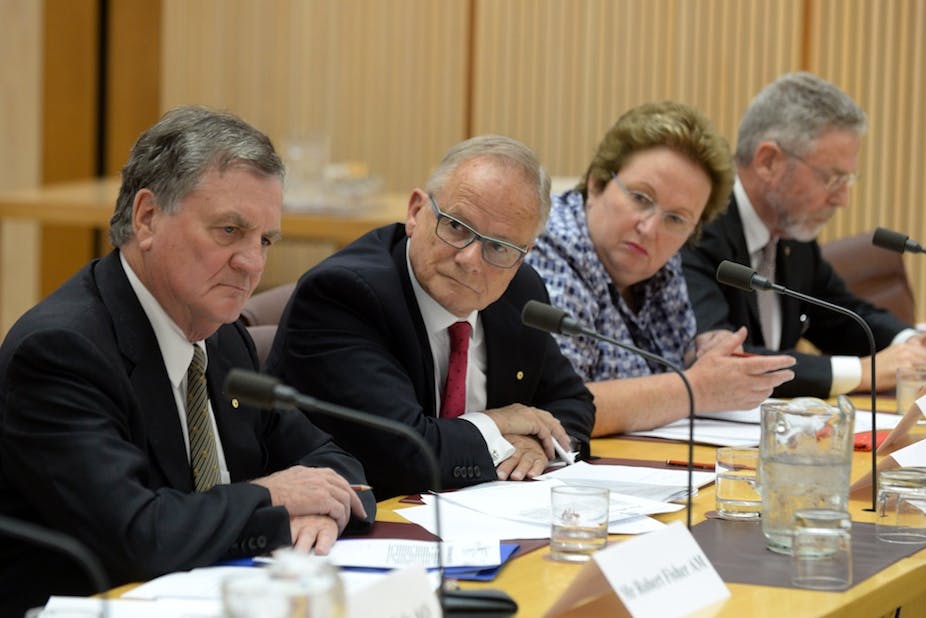News that the National Commission of Audit had been granted an extension of time shouldn’t be a surprise given the complexity of issues in the scope of its first phase.
The questions it is examining around the scope of government, the current architecture of commonwealth-state relations, the efficiency and effectiveness of government expenditure, commonwealth finances, and adequacy of existing budgetary controls and disciplines, are not simple.
Indeed, the answers will reflect a range of factors including philosophical and ideological views of the role of government in society. It’s not clear how such views can be sought, deliberated and delivered in a little over three months.
The report on phase one, due in just a few weeks, will then form the basis for phase two which will deal with Commonwealth infrastructure, and performance sector reporting and accountability.
But this week has seen two major announcements that seem to pre-empt the Commission of Audit’s report. On Wednesday came the news that the federal government will seek to merge 26 Indigenous programs into just five, part of the rationale being to slash administration costs.
Earlier in the week it was announced that it was time to revisit the foundations of our welfare system, as our current approach is unsustainable. From the Social Services minister Kevin Andrew’s comments, it is clear that the attention will be on disability and unemployment benefits, with a range of schemes out of scope including the aged pension.
This takes us to the process; there is no doubt this was a compelling part of the recent Senate Committee hearing. To start, there was considerable argy-bargy about whether a list of submissions, at least, would be made publicly available. This developed into long discussion about the processes in place inside the Commission of Audit as to who was reading submissions from whom.
For example, was it appropriate for Peter Crone who is heading up the Secretariat and who is on leave from the Business Council of Australia, to read the BCA submission? Which submissions had the chairman, Tony Shepherd, President of the BCA reviewed? Who selected which submissions went to which Commissioner? Who arranged the meetings - those who put in submissions, or the Commissioners?
Shepherd faced questioning on how would he deal with questions on propping up Qantas given he sits on the board of competitor Virgin, while Crone was grilled on how far removed he was from the BCA submission given he led a major report calling for National Commission of Audit to the major consulting house which is itself providing “pro bono” consulting work to the Commission. (What was the scale and scope of their current work with the Commonwealth and how were potential conflicts being managed?)
The issue of conflicts of interest and how these (real or perceived) are continues to in the media.
Scope was also a fascinating topic covered in the hearing; were the terms of reference fixed or malleable? The revelation part way through that two ministers had formally written to the Commission, essentially giving them the job of sorting our how many public servants to reduce the public service by, seemed to be a shock to Shepherd and was somewhat embarrassing given earlier comments he made about the independence of the Commission.
Those involved in the Senate hearing had a fixation on the numbers and rightly so. The main game is on whose figures are being used to calculate the big target given the Commission of Audit is being asked to “make recommendations to achieve savings sufficient to deliver a surplus of 1% of GDP prior to 2023-24”. It is still not clear what financial and economic data is being used, including whether Treasury and/or Finance data has a serious place in this process.
The other number that got some attention was the cost of the Commission – great “value for money” according to Mr Shepherd at the cost of just $1 million. But once we got into the detail it was not clear what this covered and what was left out; certainly the cost of all the public servants supporting the Commission was not factored into this bargain basement price.
As the speculation continues about what will be delivered in the first report, what we can be sure of is that these questions are central to public administration and policy – what is the role of government? Who does it need to work with to get this done? When should government move out of the way?
How do we measure the performance of government? What is the role of public servants? How transparent should the processes of governing be? In the complex work of public management, these questions never go away.

